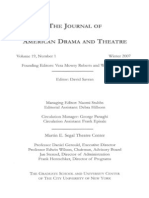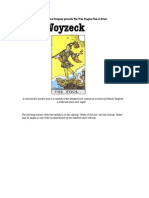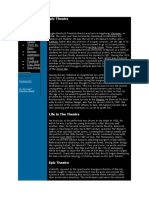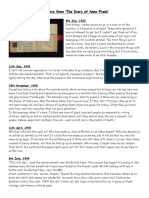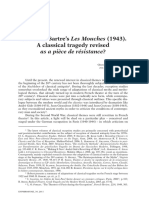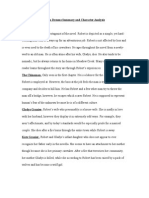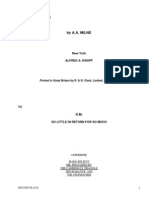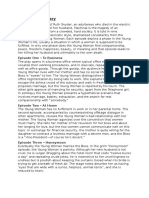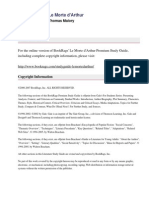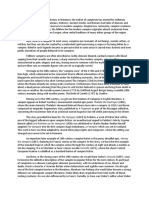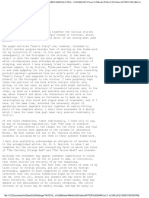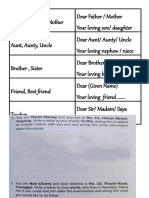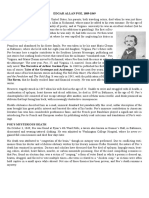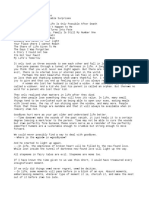Professional Documents
Culture Documents
Munro Meneseteung Annotated
Munro Meneseteung Annotated
Uploaded by
knslf100%(1)100% found this document useful (1 vote)
458 views15 pagesThe document summarizes sections from a story told over 6 numbered parts. It begins with the protagonist Almeda's early life and book of poems. Section 2 describes the town in 1879, including gangs of boys and social dynamics. Section 3 introduces Poulter coming to town and a romance developing between him and Almeda. Section 4 describes a drunken incident one night that leads Poulter to offer to walk Almeda to church. Section 5 follows Almeda spending a day writing poetry. Section 6 jumps ahead to her 1903 obituary after being chased into a swamp and dying of cold, and the narrator later visiting her grave. The summary outlines the story's structure using different perspectives and references other
Original Description:
Munro Meneseteung Annotated
Copyright
© © All Rights Reserved
Available Formats
PDF, TXT or read online from Scribd
Share this document
Did you find this document useful?
Is this content inappropriate?
Report this DocumentThe document summarizes sections from a story told over 6 numbered parts. It begins with the protagonist Almeda's early life and book of poems. Section 2 describes the town in 1879, including gangs of boys and social dynamics. Section 3 introduces Poulter coming to town and a romance developing between him and Almeda. Section 4 describes a drunken incident one night that leads Poulter to offer to walk Almeda to church. Section 5 follows Almeda spending a day writing poetry. Section 6 jumps ahead to her 1903 obituary after being chased into a swamp and dying of cold, and the narrator later visiting her grave. The summary outlines the story's structure using different perspectives and references other
Copyright:
© All Rights Reserved
Available Formats
Download as PDF, TXT or read online from Scribd
Download as pdf or txt
100%(1)100% found this document useful (1 vote)
458 views15 pagesMunro Meneseteung Annotated
Munro Meneseteung Annotated
Uploaded by
knslfThe document summarizes sections from a story told over 6 numbered parts. It begins with the protagonist Almeda's early life and book of poems. Section 2 describes the town in 1879, including gangs of boys and social dynamics. Section 3 introduces Poulter coming to town and a romance developing between him and Almeda. Section 4 describes a drunken incident one night that leads Poulter to offer to walk Almeda to church. Section 5 follows Almeda spending a day writing poetry. Section 6 jumps ahead to her 1903 obituary after being chased into a swamp and dying of cold, and the narrator later visiting her grave. The summary outlines the story's structure using different perspectives and references other
Copyright:
© All Rights Reserved
Available Formats
Download as PDF, TXT or read online from Scribd
Download as pdf or txt
You are on page 1of 15
4 (ew a
wes pow ee
y! La be
Cena” e vee
r ALICE MUNRO x
Co oH. weg Z
ot {Z
u wt
water er
;, the bool
fall name underneath: Almeda Joyne Ron The local a
to her as “our poetess.” There seet be a mixture of respe
both for her calling and for her sex—or for their predi j .
front of the book is a photograph, with the photographer's name in one cot
and the daté?1865. The book
pana a rather long nose full, ris dark eyes, which
seem cnn ee Down fs checks i ars,a lot of dark hair gathere
d Be face in droop Golls and cans At J
bi aid-trimmed dark dress ot jacket, with a lacy, eK rangement of
C7" tial frills or a bow—filling the deep V at the neck. She also weafs a hat, whey
| might be made of velvet, in a dark color to match the a
| shapeless hat, something like a soft beret, that makes’ ne’ ee artistic intentions,
or at least a shy and stubborn eccentricity, in this young woman, whose long
neck and farwaed tnclh ining head indicate as well that she is tall and slender and
somewhat awkward, From the waist up, she looks like a young nobleman. of
another century But gerhaps it was the fashion.
mother, my sister Catherine, my brother William, and me—to the 3
Canada West (a ic then was). My father was.a hamesy-makerby trad bayacul-
tivated man who quote by heart from the Bible, Shakesp€are, and the
writings of Edi 1 Burke.! He ered in this new x
able to set up at ness and ile ods stope-anid
comfortable house in which ] I live (alone
eldest of the children, when we came into
whose handsome streets I have not seen agair
eleven and my brother nine. third :
On,” Fa town
often Temetler My sister was
at we lived here, my brother
‘William Shakespeare (1564-1616), the British dramatist and poet, and Edmund Burke
(1729-1797), the British parliamentary leader, statesman, and orator. (JI
? Kingston, Ontario, is located on the northeast shore of Lake Ontario near the head of the St.
Lawrence River. (JHP)
(staddorm ercretseily’
© Meneseteung @ 1037
Aratten €. ole
and sister were taken ill of a prevalent fever and died within a few days of each
other. My dear mother did not regain her spirits after this blow to our family.
Her health declined, and aft ree years she’ died: | then became
housekeeper to my father and was happy to make his home for/twelve years,
until he died suddenly one morning at his shop.
“From my earliest years | have delighted in verse and ] have occupied
myself—and sometimes allayed my griefs, which have been no more, | know,
than any sojoumer on earth must encounter—with many floundering efforts at
} its composition. My fingers, indeed, were always too clumsy for crochetwork, and
r those dazzling productions of embroidery which one sees often today—the over-
flowing fruit and flower baskets, the little Dutch boys, the bonneted maidens
‘>—~with their watering cans—have likewise proved to be beyond my skill. So I offer
\ instead) as the product of my leisure hours, these rude posies, these ballads, cou-
plets, reflections.” Le
some of the poems: “Children at Their
My Family,” “Angels in the Snow,” “Cha
\ the Meneseteuhg,” “The Passing/of the Old Fo
_ \_ There are somit other, shortef poems, about birds
~\. storms. There is some comi¢ally inténtioned doggerél about what people are
thinking abo they-listen to the sermon in church.
‘Children 4t Their Games?? The writer, a child/ is playing with her brother
ad sister—on¢ of those games in which children,on different sides try to entice
catch each other. She plays on in the deepehing twilight, until she realizes
she is alone, and much older. Still she hears the (ghostly)
Gnd sister-calling. Come over, come ver, let Meda come over
€alled Meda in the family, or pethaps she shortened her name to fit
Pay fi
ic Gypsy Fair”: The Gypsies have an encampment near the town, a “fair,”
where they sell clothand trinkets, and the writeras a child is afraid that she may
be stolen by them, tak&h away from/her family. Instead, her family has been
taken away from her, sto es she can’t locate or bargain with.
“A Visit to My Family”? to the cemetery, a one-sided conversation.
“Angels in the Snow”: Thewriter once taught her brother and sister to make _
“angels” by lying down in theSnow and moving their arms to create wing shapes.
Her brother always jumped up carelessly, leaving an angel with a.crippled wing.
Will this be made perféet in Heaveg, or will he be flying with his own makeshift,
incircles?__
“Champlain at the Mouth of the Meneseteung”: This poem celebrates the
ular, untrue belief that the explorer sailed down the eastern shore of Lake
Pron and landed at the mouth of the major river.
“The Passing of the Old Forest”: A list of all the trees—their names, appear-
ance, and uses—that were cut down in the original forest, with a gene!
description of the bears, wolves, eagles, deer, waterfowl. 2 e
3 Samuel de Champlain (1567-1635), the French explorer who made eleven voyages to Canada,
founded Quebec, the first permanent French colony in America, and explored much of the arca
in which the story is set. (JHP)
“The second largest of the Great Lakes, bounded on the north and east by the Canadian province
of Ontario. (JHP)
ae
= Z “A sere fr Erveeds,
porte - parathela ty af fe o
1038 © ALICE MUNRO ©
“A Garden Medley”: Perhaps planned as a companion to the forest poem.
Catalogue of plants parson kammsancenentee with bits of history and ___
legend attached, and final Ca resulting from this mixture.
The poems are written in quatrains or couplets. There are a couple of
attempts at sonnets/ but) mostly the shyme scheme ssimpleahabo: ab. Te
‘more? No poem is unrhymed.
uN, thyme used is alled! “masculine” (“shore” ("by 27), though
HY onceinawhileitis*femiine” “quiver” river”).
a)
v
in need of paint|
brownish photograph. / ite eyes. No big
shade tree is in sight/ and, in fact, the tall "dns tht picid he ies the town
n , as well as the maples th:
SS fences around them to pfotect them from —
Without the shelter of those trees, there is a great exponire—back yards,
clotheslines, wo¢dpiles, patchy sheds and barns ghd privies—all bare, exposed,
|
plantains’
stump, in ar
roads, mud
out. Cows dre tethered in vacant lots or postu in back yards,
they Pigs get loose, too, and dogs roam free or nap ina fgtdly way on
the boardivalks. The town has taken root, it’s not going to vanish vet it still has ——
some of fhe look of an encampment. And, like an enc; yusy all the
time—full of people, who, within the town, ustially walk Shee rhe ‘re going;
f full of/animals, which leave horse buns, cowpats, dog turds, that ladies have to
hitch/up their skirts for; full of the noise of building and of drivers shouting at
horses and of the trains that come in several times a day.
that life in the Vidette—
7 than it will ever be again. People
past fifty usually don’tcame to a raw, new place. There are quite a few people in
the cemetery already {but)most of them died young, in accidents or childbirth or
epidemics. It’s youth that's in evidence in town. Children—boys—rove through’
the streets in gangs. School is compulsory for only four months a year, and there
> Low, short-stemmed herbs. (JHP)
new
“ar
~ pom
© Meneseteung \ 1039
"are lots of occasional jobs that even a child of eight or nine can do pulling flax,
holding horses, delivering groceries, sweeping the boardwalk in front of stores.
go” | A good deal of time they spend looking fo clvent.res SA low an
O°, |. eld woman, a drunk nicknamed Queen Aggie. They get her into a Te
y en dump her into a ditch to sober her up. They
and trundle her all over town,
yr also spend a lot of time around the railway station. They jump on shunting cars
Ke and dart between them and dare each other to take chances, which once in a
: while result in their getting maimed or killed. And they keep an eye out for any
ranger coming into town. They follow them, offer to carry their bags, and
[0° direct them (for a five-cent piece) to a hotel. Strangers who don’t look so pros-
perous are taunted and tormented. Speculation surrounds all of them—it’s like
a cloud of flies. Are they coming to town to start up a new business, to persuade
people to invest in some scheme, to sell cures or gimmicks, to preach on the
street corners? A\ll these things are possible anyday of thé week: Be on your guard,
the Vidette tells people. 7 of opportunity and danger. Tramps, con-
fidence men, hucksters, shysters, plain thieves, are traveling the roads, and par-
ticularly the railroads. ae are announced: eae invested and never seen
again, a pair of trousers ta rom the from the woodpile, eggs
Hot -
gn ies’ Heat caught in che wringét while doing the washing; aman lopped cto
Buy Ee che sowinill:¢ leaping boy killed ine fall of lumber at the luraberyard: Nobody
sleeps well. Babies wither with summer complaint, and fat people can’t catch
their breath. Bodies must be buried in a hurry. through-the
streets ringing a cowbell and calling “Repent! Repent! not a stranger this
ae ag an ho works at the butcher-shop. Take him home, wrap
him in cold wet cloths, BVe erve medicine, keep him in bed, pray for
his wits. If he doesn’t recover, he must go to the
eda Roth’s house faces on’ ferin Street, which is a street of consider-
ity. On street merchants, a mill owner, an operator of salt
re
see Bug Pearl Street, which her back windows overlook and hore
Faye
ontoyis another story. Workmen’s houses are adjacent to
Houses—t that i is all right. Things deteriorate tqward“““.
the end of the block, os \@ TERT ane becomes dismal. Nobody ee roy
poorest people, the unresfectable and andeser P poor would live theres at i
edge of a bog-hole (drained since then), called the Pearl Street
and luxuriant weeds grow there, makeshift shacks have been pt
piles of refuse and debris and crowds of runty children, slops bs
ways. The town tries to compel these people to build privies; they would jiz
as soon go in the bushes. If a gang of boys goes down there search of adven-
ture, it’s likely they'll get more than They bargain said that even the
town constable won’t go down Pearl Street on a Saturday night. Almeda Ro
has never walked past the row housing. In one of those houses lives the young
girl Annie, who helps her with her housecleaning. That young girl herself, being
a decent girl, has never walked down to the last block or amp. No dece:
wo} ever would.
same § ‘img to the east of Almeda Roth’s house, presents a
meSight at dawn. Almeda sleeps at the back of the house. She keeps to the
sarfie bedroom she once shared with her sister Catherine—she would not think
1040 © ALICE MUNRO *
of moving to the larger front bedroom, where her mother used to lie in bed all
day, and which was later the solitary domain of her father. From her window she
q can see the sun rising, the swamp mist filling with light, the bulky, nearest trees
floating against that mist and the trees behind turning transparent. Swamp oaks,
soft maples, tamarack, bitternut.
es Here a the river meets the inland sea,
| ‘Spreading her blue skirts from the solemn wood,
| think of birds and beasts and vanished men,
H — ‘on these pale sands stood.
01 ent as well as sentiment,a
ee his own nature—from-effi
n the interests of economy, itis
of our town persists in fetchit gwater from the rable tap and supple-
menting his fuel supply by’piéking up the loose coal along the railway
track. Does he think to rep4y the town or the railway company with a
supply of fra salt? ‘
—_
asses he is poked: 8 great 7
-hman. He is close, that’s all. A
@ result of his single condition,
he town tap and filling his c coal pai al ong g the Pad
self-possessed air, and a large pale wart among the bushy hairs of one eyebrow?
eople talk about a young, pretty, beloved wife, dead in childbirth or some hor-
accident, like a house fire or a railway disaster. There is no ground for this,
it adds interest. All he has told them is that his wife is dead.
‘0 this part of the country looking for oil. The first oil well in the
| world was sunk in Lambton County,” south of here, aIeETRN EITHER
i Drilling for oil, Jarvis Poulter discovered salt. He set to work to make the mos
4 of that, e tel out
| is salt wells. They are twelve hundred feet deep. Heated water is pumped down
} {into them, and that dissolves the salt. Then the brine is pumped to the surface.
“ § Located in the southeastern part of the province of Ontario. (JHP)
od 4
ae ww 1
(pute - (ene ke NE, |
ath A ge Mi . 1041 |
— pn h pat feneseteung |
/ It is poured into great evaporator pans over slow, steady fires, so that the wate :
is steamed off and the pure, excellent salt remains. A commrodtty tor which the y
|| demand will never fail. i
“The salt of the earth,” Almeda says. 1° 7 Ka {
\ “Yes,” he says, frowning. He may think this disrespectful. She-did-notintend
| { itso. He speaks of competitors in other towns who are following his Tead and try-
ing to hog the market. Fortunately, their wells are not drilled so deep, or their
efficiently. Th
aporating is not done
is salt everywhere under this land,
{ ‘Does that not mean, Almeda says, that there was once a great sca). mM 7
Very likely, Jarvis Poi ety likely. He goes on to tell her about other /J
enterprises te Drickyard, lime kiln. And he explains toher how this oper-
ates, and where the good clay is found. He also owns two farms, whose woodlots i
supply the fuel for his operations.
‘Among the couples strolling home from church on a recent, sunny //
Sabbath morning we noted a certain salty gentleman and literary lady, “272
not perhaps in their first youth but by no means blighted by the frosts of =
age. May we surmise?
This kind of thing pops up in the Videre
May they surmise, and is this courting? Alme th has a bit of money, F&
whicl a eft her, and she has her house. She is not too old to have a cou-
5 ple of children. She is a good enoupirheusekeeper, with the tendency toward {
‘ancy teedcakes and decorated tarts which is seen faifly often in old maids.
(Honorable mefitfo-at the Fall Fair.) Thete’is nothing wrong with her looks,
<\" and naturally she is in bett@rshepe than most married women of her age, not
"having been loaded down with work afitrchildce asshepased over fy
(Wim her earlier, more marriageable years, in a place Phat needs women to be part-
nered and fruitful? She was a satbee-sions |—that may have been the trou-
ble. The deaths #f her brother and sisteFan
of her no ther j
reason, in fact, a year before she died, tnd lay in hePbed.talking nonsense—
those weighed on her, so she was not livply company. ading and “fee,
i more ofa drawback, a barrier, an obsession, in the young girl “|, 5
Wale-agel woman, ohe needed something, after all; to fil her 4,
: so pethaps she has got 44
‘i,
over that. Perhap: e proud, bookish father, encouraging her?
iy Everyone takes tefor gramed thar Almeda Roth is thinking of Jarvis Poulter
yz of him: She
. sn’t want to make a fool
inal. Ifhe/auended church on Sunday eveningy Hy
luring some months of the year, to walk home after
there would be a cl
dark. He would carry a laftern. (Thasrsapeye© street lighting in town.) He
‘Ssvould swing the lantern fo light the way in front of the lady's feet and observe
delicafe shape. catch her arm as they step off the
go to church at night.
er, and walk with her to church on Sunday mornings.
‘That would bea declaration He walks her hone, past his gate as far as hers; he 1
lifts hig hat|then and leaves her. She does not invite him to come in—a woman |
living aloné could never do such a thing. As soon as a man and woman of almost
as a husband and would say yes if he asked her. And she is think:
WY doesn’t waattoget her hopes up too much, she dos:
ohh fin weaplnced
ve
© ALICE MUNRO # Vu
i
iny age ne together within four walls, it is assumed that anything may .
happen. Spontaneous combustion, inst tack of passion. ree
| ite instinct, triump! 1 senses. What possibilities men and women must Ea) _
7 see in each other to infer such dangers. Or, believing in the dangers, how often|
oF they must.
‘side she can smell his shaving soap, the barber’s oil,
his pipe tobacco, the wool and linen and leather smell of his manly clothes. The »
correct, orderly, Clothes are like those she used to brush and starch and (
She misses that job—her father’s appreciation, his dark, kind
fity. Jarvis Poulter’s garments, his smell, his movement, all cause the skin,
side of her body next to him to tingle ly hepefully, and a meek shiver raises
1 rast the hairs on her arms. Is thi a thinks of him
\coming into her—their
“4
bed beside her, preparing to take her in ar Surely he removes his hat?S
jo doesn’t know, for at this point a fit of welcome and submission overtakes her, a
rburied gasp. He would be her husbani
about marti women, and that is how many of
them have to go about creating their husbands. They have to start ascribing /|.~ |
preferences, opinions, dictatorial ways. Oh, yes, they say, my husband is very “ Av
particular. He won’t touch turnips. He won't cat fried meat. (Or he will only eat /j
fried meat.) He likes me to wear blue (brown) all the time. He can’t stand organ
music. He hates to see a woman go out barcheaded. He would kill me if | took
.)"|, one puff of tobacco. This way, bewildered, sidelong-looking men are made aver,
made into husbands, head of househol: Imeda Roth cannot imagine herself mt
doing that. She wants ama fSesn’t have to be made, who is firm already
afd determi i ner. She does not ale for companionship. /
er father—seem to her deprives! in some way, incurious. No
fat is necessary, so that they will do what they have to do. Would she ’
herself, Knowing thar dere was sir in che garth, discover how to get it out and N )
sell it? Not likely. She would be thinking about the-mneient sea. That kind of
speculation is what Jarvis Poulter has, quite properly, n time e for.
“Instead of wack for her and walking her to chute, Jarvis*Poultersmight «
More venturesome declaration. He could hire a horse and take - |
her for a drive out to the country. |
~ sorry. Glad tesbe-beside him, driven by him, receiving thi
in front of the worl to hs have the = countryside removed for her—
filmed over, in a way, by his talk reoccupations. The countryside that she
has written about in her poem a ly takes diligence and determination to |!
| ( -- seer Soe things must be disregarded. Manure piles, of course, and bogey fields
VA full of high, charred stumps, and great heap’of brush waiting for a good day for
burning. The meandering-creeks have beep straightened, tumed itite’ ditch!
with high, muddy banks. Some of the crop fields and pasture fields are fenced
wich big, clumsy uprooted stumps, others are heldsinvaltsude’sulthery of ruil
fences. The trees have all been cleared back to the woodlots. And the woodlots)
f. are all second growth. No trees or lanes or | the farmhouses,
cept a few that are newly plant looking. Clusters of log
c <) barns—the grand barns that are to dominate the countryside for the next hun;
“Sh
em
face oe vt : 1043
Ke years are ae ae to be built—and mean-looking log houses, and
every four or five miles a ragged little settlement with a church and school
store and a blacksmith shop. A raw countryside just wrenched from the forest,
swarming with people. Every hundred actes is a farm, every farm has a family,
most families have ten or twelve children. (This is the country that will send out
wave after wave of settlers—it’s already starting to send them—to northern
Ontario and the West.) It’s true that you can gather wildflowers in spring in the
woodlo u'd have to walk through herds of horned cows to get to them.
Sa yA
The Gypsieshave departed. 7
‘Their camping-ground is bare. qu et |
Oh, boldly would I bargain now fuse
“At the Gypsy Fair.» i
1 ssufféts:a good deal from sleeplessness, and the doctor has given her +
les and-nerve medicine. She takes the bromides, Ckut the drops gave her / q
;° diame that were too vivid and disturbing, so she has put the bottle by for an
_ emergency. She told the doctor her eyeballs felt dry, like hot glass, and her joints
a ached. Don't read so much, he said, don't study; dy get get yourself If good and tired out /
wl “het tremble
with ho up if. « a
spite the fi fact that &
d icine is prescribed for married women.
| ei chaste ed a clean the church, she lends a hand to
friends who are wallpaper ting ready fora wedding one of he
“famous cakes for the Sine iol picnic. On
j . Little
WA ristmas presen Of
! seller ot made byl. In fact ch
‘B ie cheesecloth bag, to strain out the juice. A
slice of cake with butter (a childish indulgence of An a
for supper. She washes her hair at the sink and sponges off heMbady, to be clean
for Sunday. She doesn’t light a lamp. She lies down on the bed withthe window
wide open and a sheet just up to her waist, and she does feel wonderfull tied.
She can even feel a little breeze. S
ima as. the night seems fiery hot-and-full_of threats. She Ties — I
sweating on her bed, and she has the impression that the noises she heats are =——
knives and saws and axes—all angry implements chopping and jabbing and boring
within her head (Buvir isn’t true As she comes further awake she recognizes
that she N& heard sometimes before—the fracas of :
Tighon Pear Stree Usa the noise centers ot aight People ae drunk, there
isalo as the fight, somebody will scream
“Murder! didn happen ina fight. An ok man i
tabbed to death in his shack, pers for #fewelallars he k in the mattress
ee ‘goes to the window. The night =
moon and with bright stars. Pegasus hangs straight ahead, over the swatip>
automatically, she counts its stars. 1 a
7Sedatives. (JHP) : Yor
fiothin
1044 © ALICE MUNRO ©
can make out distinct voices, individual contributions to the row. Some people,
like herself, have evidently been wakened from sleep. “Shut up!” they are yelling.
“S| p that caterwauling or I’m going to come down and tan the arse off yez!”
fy shuts up. It's as if there were a ball of fire rolling up Pearl Strect,
is noise, it’s yells and laughter and shrieks and
curses, and the sparks are voices that shoot off alone. [Two voices gradually distin- 1,
Bush themselves—a rising and falling howling cry and a steady throbbing, low-
pitched stream of abuse that contains all those words which Almeda assaciates_
with danger and de a)smells and disgusting sights. Someone—the
person crying out, “Kill fe now!”—is being beazen—A woman is being
{ me! Kill, me!” and sometimes her mouth seems
and triumphant about her
ry.|There is something theatrica about it And the people around are calling out,
Sr top it! Stop that!” or “Kill te k & &
sporting match or a prizefight. Yes, thinks “sino, she has noticed that before— =|
Y
it is always partly a charade with these people; there is a clumsy sort of parody, an
exaggeration, a missed connection. As if anything they did—even a murder—
sigh be comething they ide quite believe butwere powerless to stop. ,
TT , ound OF somefaing thrown—a eh a plank? a ofa
closer. Almeida can sce ¢ figure in a light dress; bent over and running. That will
be the woman. Ske hag got hold of something like a stick of wood or a shingle,
and she turns and figs it at the darker figure running afer her.
¢ on
k mow; just the two tame come on and grapple, and break
loose again, and finally fall down against Almeda’s fence. The sound they make |
becomes very confysed—gagging, vomiting, grunting, pounding. Then a long,
vibrating, choking found of pain and self-abasement, self-abandonment, which
could come from either or both of them,
ee away from the window and sat down on the bed. Is that
& the sound of murder she hhas heard? What is to be done, what is she to do? She \
(| muse light a langem, she must go downstairs and light a lantern—she must go
out into the yard, she must go downstairs. Into the yard. The lantern. She falls
over on her bed and pulls the pillow to her face. In a minute. The stairs, the
lantern. She segs herself already down there, in the back hall, drawing the bolt wn
Us ai
startled, in the early light. She thinks there is a big crow sitting
on her windgwsill, talking in a disapproving but unsurprised way about the
; : ents ofthe hight before. "Wake up and move the wheelbarrow!” itsays to her, 4
Ag, an he understand atitmeanss g wheelbarrow”
= ss
SD at once and looks cae the saindow:
Down ¢ against her fence there is a pale lur lump pressed—a body.
tt Wheelbarrow. = Se
T ie puts a wrapper over her nightdress and goes Sowa The front rooms
are still shadowy, the blinds down in the kitchen. Something goes in s
a leisurely, censorious way, reminding her of the conversation of the cro®, It’s
just the grape juice, straining overnight. She pulls the bolt and goes out the back
on. Smelling of vomi
“Yes. [ think murdered,” says Almeda. She can see a little of his cheerless
Front hall Higfrat oh a chair. “In the night | woke up. [heard a racket down on ,
Pearl Street,” SHE says, struggling to keep her voice low and sensible. “I could 27%
ee Ot a man and a woman fighting.”
He «hat and puts it on his head. He closes and locks the front
© Meneseteung © 1045
door. Spiders have draped their webs over the doorway in the night, and the hol-
lyhocks are drooping, heavy with dew. By the fence, she parts the sticky holly-
hocks and looks down and she can see.
‘A woman’s body heaped up there, turned on herside with her face squashed
down into the earth. Almeda can’t see her face. (Ruythere is a bare breast let
loose, brown nipple pulled long like a cow's teat, afidra bare haunch and leg, the
haunch bearing a bruise as big as a sunflower. The unbruised skin is grayish, like
a plucked; raw drumstick. Some kind of nightgown or all-purpose dress she has
around the side of her house between the apple trees and the veranda; she opens
the front gate and ees down Dufferin Street to Jarvis Poulter’s house, which is
the nearest to hers. She slaps the flat of her hand many times against the door.
“There is the body of a woman,” she says when Jarvis Poulter appears at =|
it. Urine, drink, vomit.
Barefoot, in her nightgown and flimsy wrapper, Almeda runs away. She runs |
He is in his dark trousers, held up with braces, and his shirt is half unbuttoned,
his face unshaven, his hair standing up on his head. “Mr. Poulter, excuse me. A
body of a woman. At my back gate.”
He looks at her fiercely. “Is she dead?”
His breath is dank, his face creased, his eyes bloodshot.
pic
door, and puts the Key in his pocket. They walk along the boardwalk and she
sees that she is in her bare feet. She holds back what she feels a need to say
next—that she is-tesponsible, she could have run out with a lantern, she could
have creamed (ovo needed more screams?), she could have beat the man
off. She could fave run for help then, not now._
ey turn down Pearl Street, instead of entering the Roth yard. Of course
the body is still there. Hunched up, half bare, the same as before.
Jarvis Poulter doesn’t hurry or halt. He walks straight over to the body and
looks down at it, mt leg with the toe of his boot, just as you’d nudge a_
dog or a sow. “e — SSS
‘ou,” he says, not too loudly but firmly, and nudges again. et ae
Almeda tastes bile at the back of her throat. 7 MIF
“Alive,” says Jarvis Poulter, and the woman confirms this. She stirs, she
grunts weakly.
Almeda says, “I will get the doctor” 1f she hes touched -the-ssoman, if she
had forced herself to touc! > she would not have made such a mistake.
“Wait,” says Jarvis Poulter. “Wait. Let’s sce if she can get up.”
“Get up, now,” he says to the woman. “Come on. Up, now. Up.”
The body heaves itself onto all:
head is lifted—the hair all matted with blood and vomit—and the woman
begins to bang this head, hard and rhythmically, against Almeda Roth's picket
fence. As she Bangs her head she finds her voice, and lets out an open-mouthed
yowl, full of strength and what sounds like an anguished pleasure.
“Far from dead,” says Jarvis Poulter. “And I wouldn/t bother the doctor.”
“There’s blood,” says Almeda as the woman turnsher smeared face.
buymeten.
1046 ALICE MUNRO ®
“From her nose,” he says. “Not fresh.” He bends down and catches the hor-
tid hair close to the scalp to stop the head banging.
“You stop that now,” he says. “Stop it- Gwan home now. Gwan home, where
you belong.” The sound coming out of the woman’s mouth has stopped. He shakes
her head slightly, warning her, before he lets go of her hair. “Gwan home!
Released, the woman lunges forward, pulls herself to her feet. She can walk.
She weaves and stumbles down the street, making intermittent, cautious noises
of protest. Jarvis Poulter watches her for a moment to make suj
her way. Then he finds a leaf, fich he wipes his hand. He
says, “There goes your dead body!”
The back gate being locked, they walk around to the front. The front gate
stands open. Almeda still feels sick. Her abdomen i is bloated; she is hot and dizzy.
perd “The front door is Tocl intly. kitchen.’
only he would leave her, i the pri .
4
ghuk Fal
tone of harsh jovialit
i he bas fever betas Head fg hie "No ead fe
’s only the consequences of drink. A lady oughtr’t to be liv-
kone 0 close coalbad neighborhood.” He takes hold of her am jus above
the elbow. She can’t open uth to speak to him, to say thank you. If sh
opened her ee
a jarvis Poulter feels for Almeda Roth at this moment is just what he has ae 4
)}) | noe fele during all chose circumspect walks and all his own solitary calculations oa
J of her probable worth, undoubeed respectability, edequate comelines, Meshis
a wife. No’
1 . He is Be cre
irred by her bosenel hele -premeneelf gray bur dict 28 sofi—her flushed ve “
face, her light clothing, which nobody but a husband should see. And
wy, indiscretion, \éf agitation, her foolishness, her need?
as *T will call on you later,” he says to her. “T will walk with yo | you to chur. ss
was discovered, by a lady resident there, the body of a certain woman of
Pearl Street, thought to be dead but only, as it tured out, dead drunk. She
‘was roused from her heavenly—or otherwise—stupor by the firm persua-
sion of Mr. Poulter, a neighbour and a Civil Magistrate, who had been
summoned by the lady resident. Incidents of this sort, unseemly, trouble-
of ‘At the comer of Pearl and Dufferin streets last Sunday morning there
some, and disgraceful to our town, have of late become all too common.
¥
‘I sit at the bottom of sleep,
‘As on the floor of the sea.
And fanciful Citizens of the Deep
Are graciously greeting me.
jarvis Poulcer ame and she fuetemd her front gate close,
‘0 the privy. ee telief is not complete, however, and she realizes
at the pain and fullness in her lower body come from an accumulation of men-
|
5A course, prickly herb. (JHP) att
v
|
|
wren
© Meneseteung @
strual blood that has not yet started to flow. She closes and locks the back door.
remembering Jarvis Poulter’s words about church, she writes on a piece of {*“—
paper, “I am not well, and wish to rest today.” She sticks this firmly into
side frame of the little window in the front She locks that door, too. She is
trembling, as if from a great shock or danger she builds a fire, so that she can
make tea. She boils water, measures the tea leaves, makes a large po’
whose steam and smell sicken her further. She pours out a cup while the tea is
still quite weak and adds to it several dark drops of nerve medicine. She sits to
drink it without raising the kitchen blind. There, in the nfiddle of the
the cheesecloth bag hanging on its broom handle between fhe two chai
The grape pulp and juice has stained the swollen cloth a dafk purple. Plop, pli
(uez_ into the basin beneath. She can’t sit and Took at such a thin, ie takes
“ the teapot, and the bottle o D othe d
sitting herein to go by ot
stirring up clouds of dust. The roads will be getting bot a
0. ae pened and a man’s confident stepxSound
("hearing is so sharp she seems to hear the papgf taken ou
gp") unfolded—she can almost hear him reading ig¢hear the word
+ | the footsteps go the other way, down the sefs. The gate closd
wo} to her of tombstones—it makes her laygh. Tombstones are
. street on their
sions preoccupied and severe. Théchurch bells are ringing.
en the clock in the hal/trikes twelve and an hour has jhassed.
her veranda. Her
of the frame and
in his mind. Then
An image comes
“ are rhprching down the
Le booted feet, theyrfong bodies inclined forlpard, their expres:
1047
the out-
t of tea,
floor, is
ir backs.
her cup,
The'house'is getting hor She drinks more tea and adds moe medicine. She
knows that the medicine is affecting her. It is responsible for er extaordinary
Ws languor, her perfect immobility, her unresisting surrender to her surroundings.
at is all right: Tt seems necessary.
Her surroundings—some of her surroundings—in the dining room are these:
walls covered with dark green garlanded wallpaper, lace curtains and mulberry
velvet curtains on the windows, a table with a crocheted cloth and a bowl of wax
fruit, a pinkish-gray carpet with nosegays” of blue and pink roses, a sideboard
spread with embroidered runners and holding various patterned plates
and jugs
ese pat-
and the silver tea things. [A lot of things to watch. For every one of tl
;—— teins, decorations sence fecorations, seems charged with life, ready to mov : .
possibly to explode. Almeda Roth’s occupation throughout the day is to keep an
eye on them. Noe to prevent their alteration so much as to catch them at it—to
nderstand it, to be a part of it
no need to leave Te There roteven the thought of leaving it
Of cousge, Almeda in her observations cannot escape Words She
she can(burjhe can’t. Soon this glowing and swelling begins to suggest
not specif words but a flow of words somewhere, just about ready
So much is going on in this room that there is
ay think
words—
to make
themselves known to her. Poems, even. Yes; again, poems. Or one poem. Isn’t
that the idea—one very great poem thar will. contain everything.and,
oh, that
will make all che other poems, the poems she has written, inconsequential, mere
trial and error, mere rags? Stars and flowers and birds and trees and angels inthe |
snow and dead children at twilight—that is not the half of it You have to get in
EEE
Small bunches of flowers. (JHP)
a
ne
&
ig
|
|
|
|
|
|
}
1048 © ALICE MUNRO
the obscene racket on Pearl Street and the polished toe of Jarvis Poulter’s boot
and the plucked-chicken haunch with its blue-black flower. Almeda is a tong
way now from human i cai household considera .
doesn’t think about what could be done for that woman or about keepi
Poulter’s dinner warm and hanging his long underwear on the line,
grape juice has overflowed and is running over her kitchen
(P_ boards of the floor, and the stain will never come out.
(She has to think of so many things at once—C
Indians and the salt deep in the cath bu well & the salt the money, the "4,4
money-making intent brewing forever in heads like Jarvis Poulter’s. Also, the y/")
brutal storms of winter and the clumsy and benighted pee ‘on Pearl Street. The © w-*
changes of climate are often violent, and if you think about it there is no peace *
even in the stars. All thi be borne only if it is channeled into a poem, and
p) the word ochawnelaP is appropriate, because the name of the poem will be—it| |
" is—"The Meneseteung.” The name of the poem is the name of the river. No, in f{ |!
_4*y fact ivisthe river, the Meneseteung, that is the poem—with its deep holes and
fn rapids and blissful pools under the summer trees and its grinding blocks of ice
jv?
/
thrown up at the end of winter and its desolating spring floods. Almeda looks
| deep, deep into che river-of her mind and into the tablecloth, and she sees the
| crocheted roses floating. They look bunchy and foolish, her mother’s crocheted
roses—they don’t look much like real flowers(But Aheir effort, their floatin,
independence, their pleasure in thet silly selvessdes seem to her so admirable.
Aho; sign. eseteung. ag ae
0 ; WhehShe Goes our to the privy again
and discovers that she is bleeding, her flow has stated. She will have to get a
iy!" towel, strap it on, bandage herself up. , in health, has she passed a
{"" | whole day in her nightdress. She doesn’t feel'any particular anxiety about this.
On her way through the kitchen she walks throug] rape juice. She
she hasn’t thought that crocheted roses could float away or that tomb-
could huniy down the street She doesn’t mistake thae for reality,
herd :
Father, Mother, — \y
Sister, Brother, :
i) 1 ) Have you no word to say? _
. | ao bt
\\/ — Aipril22;1903y At her residence, on Tuesday last, between three and |
four o’clock in the afternoon, there passed away a lady of talent and
i refinement whose pen, in days gone by, enriched our local literature with
Y a volume of sensitive, eloquent verse. It is a sad misfortune that in later
ETL
© Meneseteung 1049
years the mind of this fine person had become somewhat clouded and her
behaviour, in consequence, somewhat rash and unusual. Her attention to
decorum and to the care and adomment of her person had suffered, to the
degree that she had become, in the eyes of those unmindful of her former
and daintiness, a familiar eccentric, or even, sadly, a figure of fun.
(ey now all such lapses pass from memory and what is recalled is her
excellent published verse, her labours in former days in the Sunday
school, her dutiful care of her parents, her noble womanly nature, chari-
table concerns, and unfailing religious faith. Her last illness was of merci-
fully short duration. SI Id, after having become thoroughly wet He
is g. (It has been said that some urchins
nef) from a ramble in the Pearl Street bo;
yt chased her i and such is the boldness and cruelty of some of |/7~.//
Ip. tleg »
our youth, and their observed persecution of this lady, that the tale can-
—_——
not be entirely discounted.) The cold developed into pneumonia, and she
died, attended at the last by a former neighbour, Mrs. Bert (Annie) Friels,
who witnessed her calm and faithful end.
1 ¢ of the founders of our community, an early maker V¥0°
and shaker of this town, was abruptly removed from our midst on
Monday morning last, whilst attending to his correspondence in the
office of his company. Mr. Jarvis Poulter possessed a keen and lively com-
mercial spirit, which was instrumental in the creation of not one but sev-
eral local enterprises, bringing the benefits of industry, productivity, and
employment.to‘our town, SSeS een maimbehan
Mst
in the graveyard. I found the family stone. There was 247%
just one name on it—Roth. Then I noticed two flat stones in the ground, a dis-
tance of a few feet—six feet?—from the upright stone. One of these said “Papa,”
the other ‘Mama.’ Farther out from these I found two other flat stones, with the
names William and Catherine on them. | had to clear away some overgrowing
grass and dirt to see the full name of Catherine. No birth or death dates for any-
body, nothing about being dearly beloved. It was a private sort of ializing,
not for the world. There were no roses, either—no sign of rosebus|
females it. “Toeggrmuneerieerer ues such things, theyare a nui-
sance to the lawnmower, and if there is nobody left to object hé will’pull’ them
out
out.
Tthought that Almeda must have been buried somewhere else. is
plgerareongtT— at the time of the two children’s death: rill have
een expected to marry, and to lie finally beside her husband. They might not
have left room for her here. The#il'Saw'that the stones in the ground fanned out “=,
from 5 upright stone. First the two for the parents, then the two for the chil- <2,
dren{ but these were placed in such a way that there was room for a third, to “<-
comptefe the fan. I paced out from “Catherine” the same number of steps that it $4n¢
took to get from “Catherine” to “William,” and at this spot I began pulling grass
and scrabbling in the dirt with my bare hands. Soon | felt the stone and knew
that I was right. I worked away and got the whole stone clear and I read the
name ‘Meda.’ There it was with the others, staring at the sky.
~” I made sure I had got to the edge of the stone. That was all the name there
Was=Meda. So it was true that stie was'called by that name in the family. Not
mee
1050 @ ALICE MUNRO @
just in the poem. Or perhapsish@!€hose her tiame from the poem, to be written
on her stone.
Tethought that there wasn’t anybody alive in the worl but ne who would
know phis, who wo} :
do so Butberhaps | P of v structure:
be drivert to find tj
knowing all along 4 1st person (Alice-like) narrator which
notebooks, scraping takes over entirely in the last 4 para
of gecing this trickl}
rubbish.
inter-texts: Almeda's preface, her poems,
the Vidette, the grave markings
6 numbered sections . . A
1st modulates into we, as in the town
4 Almeda's book, her ear talking, and then mostly into a 3rd
, corporate gossipy p of v
2 1879 the life of the tow! | .
gangs of boys and the sq 1st modulates into Meda's mind (and
then out of it as narrator)
3 Poulter comes to town . .
Almeda, she want's a sigf 2!SO Poulter's p of vis gotten across as it
were in dialogue
4 August hot night Saturday:
Time Flow
Objective chronology 1840 Meda born, 1854 Kingston to the town, 1857 brother
and sister die, 1860 mother dies, 1872 father dies, photo 1865, Offerings 1873,
story action August 1879, died 1903, Poulter dies 1904, narrator 1988 (148 years
not counting father/mother extension)
Section 1 concentrates on the book (1873) and uses it to tells us about Meda's life
from 1840-1873 when the poems come out.
Section 2 1879 life in the town
Section 3 1879 focus on Poulter coming to town some time prior to 1879 and giving
the reader the courtship dance leading to
Section 4 Saturday-Sunday, August, 1879 focuses on the night fracas and Poulter
coming the the rescue and asking to walk her to church
Section 5 follows on through Sunday
Section 6 jumps ahead to 1903, then 1904, then 1988.
Of course, the time flow is elastic: epigraphs from poems refer back to earlier
events, tie-backs about reading and the father, rehearsal technique sweeping
through the chronology; also the narrator tells us about now (then/now
constructions) in describing the village and also comments on events from an
external modern p of v occasionally.
You might also like
- PlatonovDocument2 pagesPlatonovDacian Neacsu0% (1)
- A Propos of "Lady Chatterley's Lover" - D.H. LawrenceDocument3 pagesA Propos of "Lady Chatterley's Lover" - D.H. Lawrenceguepa_apple100% (2)
- God Bless You MR Rosewater Online BookDocument3 pagesGod Bless You MR Rosewater Online BookErin0% (2)
- Blasted Sarah KaneDocument23 pagesBlasted Sarah KaneLeonardo MachadoNo ratings yet
- She Ventures and He WinsDocument64 pagesShe Ventures and He WinsberwangerNo ratings yet
- Anna Karenina - WikipediaDocument91 pagesAnna Karenina - WikipediaNovalia DuwitNo ratings yet
- No More MasterpiecesDocument10 pagesNo More MasterpiecesaladygreyNo ratings yet
- Remembrances The Experience of Past in Classical Chinese LiteratureDocument79 pagesRemembrances The Experience of Past in Classical Chinese LiteratureoskrabalNo ratings yet
- Information About The CagebirdsDocument1 pageInformation About The Cagebirdssuchislife810No ratings yet
- Strindberg and The Greater NaturalismDocument12 pagesStrindberg and The Greater Naturalismandré_buriti100% (1)
- The Makropulos Affair (Opera)Document4 pagesThe Makropulos Affair (Opera)xelamixamNo ratings yet
- Saddik, Annette J.Document194 pagesSaddik, Annette J.Nudzejma DurmisevicNo ratings yet
- JADT Vol19 n1 Winter2007 Lee Having Favorini BarriosDocument100 pagesJADT Vol19 n1 Winter2007 Lee Having Favorini BarriossegalcenterNo ratings yet
- Ngā+Pou+Wahine+-+Male WadawdDocument4 pagesNgā+Pou+Wahine+-+Male WadawdNicholas RavlichNo ratings yet
- The Catcher in The RyeDocument3 pagesThe Catcher in The Ryeapi-356713465100% (1)
- Lord of The Flies MWDSDocument9 pagesLord of The Flies MWDSEmily LangNo ratings yet
- Pedro ParamoDocument3 pagesPedro ParamoErica Santiago100% (1)
- Super Sad True Love StoryDocument2 pagesSuper Sad True Love StoryAiraNo ratings yet
- Woyzeck: The G. Buchner Sideshow Company Presents The True Tragical Tale of FranzDocument21 pagesWoyzeck: The G. Buchner Sideshow Company Presents The True Tragical Tale of Franzcjt3007No ratings yet
- Adding Machine LA Spring Break Joshua Schmidt PDFDocument2 pagesAdding Machine LA Spring Break Joshua Schmidt PDFAnonymous 8dcT1KNo ratings yet
- Collected Plays of Anton Chekhov (Unabridged): 12 Plays including On the High Road, Swan Song, Ivanoff, The Anniversary, The Proposal, The Wedding, The Bear, The Seagull, A Reluctant Hero, Uncle Vanya, The Three Sisters and The Cherry OrchardFrom EverandCollected Plays of Anton Chekhov (Unabridged): 12 Plays including On the High Road, Swan Song, Ivanoff, The Anniversary, The Proposal, The Wedding, The Bear, The Seagull, A Reluctant Hero, Uncle Vanya, The Three Sisters and The Cherry OrchardNo ratings yet
- The Championship of The Universal Class StruggleDocument12 pagesThe Championship of The Universal Class StruggleClayton de OxaguiãnNo ratings yet
- Poemas de Maya DerenDocument3 pagesPoemas de Maya DerenOscar Bodie0% (1)
- CheeverDocument1 pageCheeverAlbert MelNo ratings yet
- Brecht TimelineDocument3 pagesBrecht Timelineapi-281813793No ratings yet
- A Doll's House - A Critical IntroductionDocument20 pagesA Doll's House - A Critical IntroductionAadivya RaushanNo ratings yet
- Bertolt and Stanislavski Practitioner SummariesDocument8 pagesBertolt and Stanislavski Practitioner SummariesDaksh BaconNo ratings yet
- Dan Rebellato - Sarah Kane. An AppreciationDocument3 pagesDan Rebellato - Sarah Kane. An AppreciationCaro MNo ratings yet
- Lady of The DawnDocument2 pagesLady of The DawnhdjopsdkfjbdkoseNo ratings yet
- Letters of Anton Chekhov by Chekhov, Anton Pavlovich, 1860-1904Document226 pagesLetters of Anton Chekhov by Chekhov, Anton Pavlovich, 1860-1904Gutenberg.org100% (1)
- Extracts From The Diary of Anne FrankDocument1 pageExtracts From The Diary of Anne FrankDanny TNo ratings yet
- Cultural Infidels: Film and Performance For Consenting AdultsDocument11 pagesCultural Infidels: Film and Performance For Consenting AdultslarrybobsfNo ratings yet
- The Dramatic Works of Gerhart HauptmannDocument965 pagesThe Dramatic Works of Gerhart HauptmannLeonardo Da Hora Cruz100% (1)
- 0011 Clive Barker On His LifeDocument6 pages0011 Clive Barker On His LifeMethuen DramaNo ratings yet
- Laurynas Katkus, Laurynas Katkus - Grotesque Revisited - Grotesque and Satire in The Post - Modern Literature of Central and Eastern Europe (2013, Cambridge Scholars Publishing)Document201 pagesLaurynas Katkus, Laurynas Katkus - Grotesque Revisited - Grotesque and Satire in The Post - Modern Literature of Central and Eastern Europe (2013, Cambridge Scholars Publishing)Ramona SasNo ratings yet
- Six Characters Looking For An AuthorDocument32 pagesSix Characters Looking For An AuthorMonika ValkunaiteNo ratings yet
- Arthur Miller - Life and Works PresentationDocument25 pagesArthur Miller - Life and Works Presentationtau24No ratings yet
- Jean-Paul Sartres Les Mouches 1943 - A C PDFDocument12 pagesJean-Paul Sartres Les Mouches 1943 - A C PDFAdel Farouk Vargas Espinosa-EfferettNo ratings yet
- Play - Samuel BeckettDocument12 pagesPlay - Samuel BeckettSophie CapobiancoNo ratings yet
- The Wild DuckDocument4 pagesThe Wild DuckMahmoud Radwan100% (1)
- Jon FosseDocument4 pagesJon FosseNoe CarNo ratings yet
- Train Dreams Summary and Character AnalysisDocument6 pagesTrain Dreams Summary and Character AnalysisToys R Russ0% (1)
- Irish Plays and Playwrights by Weygandt, Cornelius, 1871-1957Document156 pagesIrish Plays and Playwrights by Weygandt, Cornelius, 1871-1957Gutenberg.orgNo ratings yet
- Spalding Gray Last InterviewDocument14 pagesSpalding Gray Last Interviewjennifer_lowe_30No ratings yet
- Second Plays by Milne, A. A. (Alan Alexander), 1882-1956Document198 pagesSecond Plays by Milne, A. A. (Alan Alexander), 1882-1956Gutenberg.orgNo ratings yet
- 0H/Hukrog V7Khdwulfdo%Lrphfkdqlfv$Q$Fwlqj7Hfkqltxh Iru7RgdDocument22 pages0H/Hukrog V7Khdwulfdo%Lrphfkdqlfv$Q$Fwlqj7Hfkqltxh Iru7RgdCorina Mihaela PredescuNo ratings yet
- 1124227Document28 pages1124227buddha91No ratings yet
- Hilda Doolittle літератураDocument11 pagesHilda Doolittle літератураLiliaNo ratings yet
- Macbeth The Naked Babe and The Cloak of Manliness Cleanth BrooksDocument13 pagesMacbeth The Naked Babe and The Cloak of Manliness Cleanth BrooksMilan MNo ratings yet
- Scandinavian CinemaDocument2 pagesScandinavian CinemamostlytangentialNo ratings yet
- The Man Who Was Almost A ManDocument3 pagesThe Man Who Was Almost A ManmariaNo ratings yet
- August StrindbergDocument11 pagesAugust StrindbergBlanaru Tofanel Oana CristinaNo ratings yet
- Examine The Original Reviews of Look Back in AngerDocument9 pagesExamine The Original Reviews of Look Back in AngerKatie Louise LambertNo ratings yet
- Earl Jackson Strategies of Deviance - Studies in Gay Male Representation - Theories of RepresentationDocument632 pagesEarl Jackson Strategies of Deviance - Studies in Gay Male Representation - Theories of RepresentationMayanaHellen100% (1)
- The Purpose and Effects of Metatheatre in ShakespeareDocument4 pagesThe Purpose and Effects of Metatheatre in ShakespeareMichael HaaseNo ratings yet
- Adapting Nineteenth-Century France: Literature in Film, Theatre, Television, Radio and PrintFrom EverandAdapting Nineteenth-Century France: Literature in Film, Theatre, Television, Radio and PrintNo ratings yet
- Comparative Literary Analysis of The Room by Harold Pinter and The Bald Soprano Bye Eugene EunescoDocument20 pagesComparative Literary Analysis of The Room by Harold Pinter and The Bald Soprano Bye Eugene EunescoOsama Mirkhan NabiNo ratings yet
- Silence I N Harold Pinter PDFDocument8 pagesSilence I N Harold Pinter PDFDrAbdul-Settar Abdul-Latif MalallahNo ratings yet
- Machinal SummaryDocument3 pagesMachinal SummaryBella ReynoldsNo ratings yet
- Schiller, F. The RobbersDocument197 pagesSchiller, F. The RobbersMatheus Ichimaru BedendoNo ratings yet
- A Selection From The Comedies of Marivaux by Marivaux, Pierre Carlet de Chamblain De, 1688-1763Document277 pagesA Selection From The Comedies of Marivaux by Marivaux, Pierre Carlet de Chamblain De, 1688-1763Gutenberg.org100% (1)
- Alexandro Manzoni - CriticsDocument25 pagesAlexandro Manzoni - CriticsknslfNo ratings yet
- Alessandro ManzoniDocument3 pagesAlessandro Manzoniknslf100% (1)
- The Man in The Iron Mask PDFDocument76 pagesThe Man in The Iron Mask PDFknslfNo ratings yet
- Lem or Ted ArthurDocument214 pagesLem or Ted ArthurknslfNo ratings yet
- Aesops FablesDocument102 pagesAesops FablesknslfNo ratings yet
- Metrics Definitions: Jason Gorman Driving SPI With M EtricsDocument10 pagesMetrics Definitions: Jason Gorman Driving SPI With M EtricsknslfNo ratings yet
- OO Design Principles & Metrics - ExercisesDocument17 pagesOO Design Principles & Metrics - ExercisesknslfNo ratings yet
- Willhelalm LitencycWorks4784Document3 pagesWillhelalm LitencycWorks4784knslfNo ratings yet
- OO Design Principles & MetricsDocument44 pagesOO Design Principles & MetricsknslfNo ratings yet
- VonStrassburg LitencycPeople5392Document1 pageVonStrassburg LitencycPeople5392knslfNo ratings yet
- Can Training PresentationDocument58 pagesCan Training Presentationknslf100% (18)
- 46 Brilliant Short Novels.Document25 pages46 Brilliant Short Novels.John Bairstow100% (3)
- Evolution of Dystopian MediaDocument15 pagesEvolution of Dystopian MediaAmna ShirinNo ratings yet
- A Lucky Day Use The Simple PastDocument2 pagesA Lucky Day Use The Simple PastTanya UsNo ratings yet
- Holden Caulfield RevistedDocument2 pagesHolden Caulfield Revistedapi-590678581No ratings yet
- JAMES JOYCE Is Probably One of The Most Radical Innovators of The Modern NovelDocument6 pagesJAMES JOYCE Is Probably One of The Most Radical Innovators of The Modern NovelFrancescopio PalmieriNo ratings yet
- VampiresDocument2 pagesVampiresAiman Zikry bin AzmiNo ratings yet
- Marvel's PhaseDocument16 pagesMarvel's PhaseSatyam SrivastavNo ratings yet
- Kampong Boy by LatDocument16 pagesKampong Boy by Latmisrael guinaNo ratings yet
- Flat Stanley Stanley and The Magic Lamp: Warm UpDocument4 pagesFlat Stanley Stanley and The Magic Lamp: Warm UpDeepti DarakNo ratings yet
- Rage Across AustraliaDocument146 pagesRage Across AustraliaGabryel100% (2)
- I Say No Wilkie CollinsDocument245 pagesI Say No Wilkie CollinsnatantilahunNo ratings yet
- Batman 031 - PDF RoomDocument51 pagesBatman 031 - PDF RoomdanielpreppychinoNo ratings yet
- Grade 12 Letter WritingDocument6 pagesGrade 12 Letter WritingJERRYNo ratings yet
- Grade 11: 21 Century Literature From The Philippines and The World Quarter 4 - Module 2Document15 pagesGrade 11: 21 Century Literature From The Philippines and The World Quarter 4 - Module 2SATORI'S PARADISENo ratings yet
- Narrative EssaysDocument7 pagesNarrative EssaysAanchal AroraNo ratings yet
- Stewart 1982 Epistemology of The Horror StoryDocument19 pagesStewart 1982 Epistemology of The Horror StoryDaniela KangnissoukpeNo ratings yet
- MELVILLE - Benito CerenoDocument3 pagesMELVILLE - Benito CerenoauroramastrilliNo ratings yet
- Primary Bibliography and Summer Reading 2024Document4 pagesPrimary Bibliography and Summer Reading 2024brian chenNo ratings yet
- Research Paper Over Edgar Allan PoeDocument8 pagesResearch Paper Over Edgar Allan Poevvomvqwgf100% (1)
- Mage The Awakening Grimoire of Grimoires (022 102)Document81 pagesMage The Awakening Grimoire of Grimoires (022 102)SQ graficaNo ratings yet
- Review - 8'Document4 pagesReview - 8'lethaiduy103No ratings yet
- Poe's Psychological HorrorDocument3 pagesPoe's Psychological HorrorVanessa RidolfiNo ratings yet
- Beauty and The BeastDocument14 pagesBeauty and The BeastAgung SatriaradisuNo ratings yet
- Doomed Forgotten Realms Fall of Vecna Quill and Cauldron PDF - Compressed 1 52Document52 pagesDoomed Forgotten Realms Fall of Vecna Quill and Cauldron PDF - Compressed 1 52TimeLineNo ratings yet
- The History of Postmodernism in Literature - DraftDocument75 pagesThe History of Postmodernism in Literature - DraftDavid Emmett100% (3)
- Hi Bye MamaDocument2 pagesHi Bye MamajeonbiancaNo ratings yet













